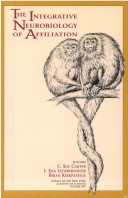The Integrative Neurobiology of Affiliation
1 total work
The Integrative Neurobiology of Affiliation
Published 1 December 1996
This book examines the biological, especially the neural, substrates of affiliation and related social behaviors. Affiliation refers to social behaviors that bring individuals closer together. This includes such associations as attachment, parent-offspring interactions, pair-bonding, and the building of coalitions. Affiliations provide a social matrix within which other behaviors, including reproduction and aggression, may occur. While reproduction and aggression also reduce the distance between individuals, their expression is regulated in part by the positive social fabric of affiliative behavior.Until recently, researchers have paid little attention to the regulatory physiology and neural processes that subserve affiliative behaviors. The integrative approach in this book reflects the constructive interactions between those who study behavior in the context of natural history and evolution and those who study the nervous system.The book contains the partial proceedings of a conference of the same title held in Washington, DC, in 1996. The full proceedings was published as part of the Annals of the York Academy of Sciences.
